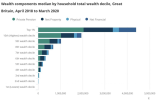A lot of economic policy is based on things being normally distributed: the bell curve with thin tails of very poor people and very rich people, and a big bulge in the middle containing what politicians love to refer to as "hard working families".
But the economy hasn't actually worked that way for a long time, going back to financial deregulation in the 1980s. Now it is like there are two teams, who I call the green team and the red team.
The green team have more income than expenditure, and are saving, or, if they don't have more income than expenditure, they still have easy access to credit. People in the green team have the green light to carry on spending, whatever the Bank of England do to interest rates, and whatever the government do to taxes.
The red team, on the other hand, are those with more expenditure than income, and are getting deeper into debt, or have lost all access to credit. Every pound of income, and every change in prices, affects what they can afford, and how they live their lives. The red team are getting whacked from all directions, and they have the red light to stop spending. Food banks are indeed a symptom of this.
Sadly, it is quite common for people to lose their place in the green team, and end up in the red team. This can be due to losing their job or their health, or some traumatic event. On the other hand, once in the red team, it is very hard to get back into the green team.
There's little evidence that many economists and policymakers grasp any of this.

